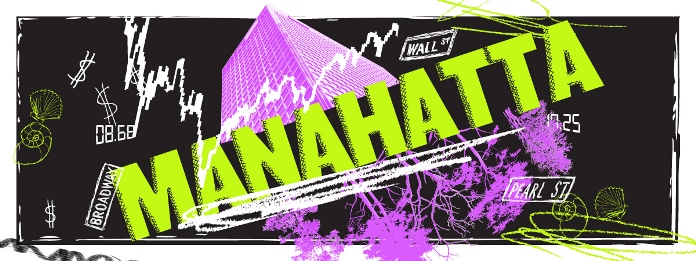In 1626, Peter Minuit, a Netherlandish merchant and Director General of the Dutch West India Company, purchased the island of Manahatta (or “Island of Many Hills”) from the Lenape people, who did not practice and had no concept of land ownership, for a reputed 60 guilders worth of wampum and other trade items (later estimated to be the equivalent of $24), ultimately resulting in the taxation, killing, and displacement of the indigenous population. In 2008, Manhattan’s Wall Street Financial District was at the center of a global economic crisis climaxing in the bankruptcy of the Lehman Brothers investment banking firm, triggered by predatory subprime mortgage lending that targeted low-income home buyers, who defaulted on their payments and faced foreclosure, causing a collapse of the securities industry.
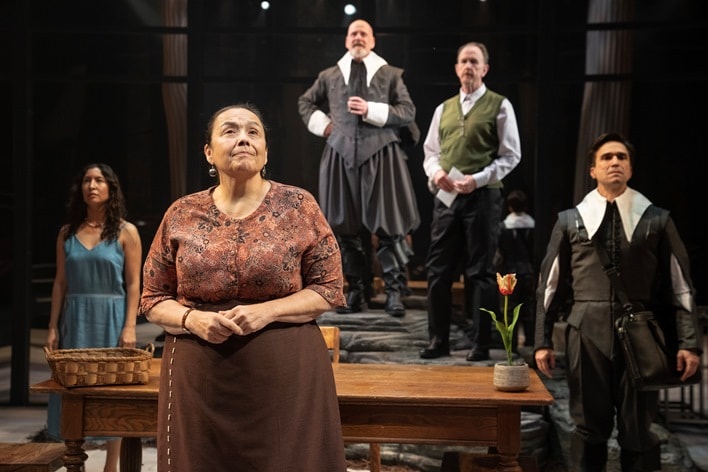
In 2013-14, Mary Kathryn Nagle – a playwright, attorney, citizen of the Cherokee Nation of Oklahoma, advocate for Native rights and sovereignty, and alumna of The Public Theater’s Emerging Writers Group – created Manahatta, an original examination of the connection between the two eras as seen through the lens of the fictional Jane Snake, a brilliant and ambitious Lenape woman with degrees in Financial Mathematics from MIT and Stanford, who leaves her family in Oklahoma (where the supplanted Lenape were resettled) for a banking position in New York with Lehman Brothers, just years prior to the financial crash. It’s a path that has a direct impact on her mother and an eye-opening effect on her, awakening an understanding of the damage greed can do and a new appreciation for her ancestral legacy.
Following its world premiere at the Oregon Shakespeare Festival in 2018, and a production at Yale Repertory Theatre in 2020, the play is now in its NYC debut for a limited engagement Off-Broadway at The Public, which consistently acknowledges its location on the original homeland of the Lenape. Directed by Obie Award winner Laurie Woolery (The Public’s Director of Public Works), the time-traveling narrative moves back and forth between the 21st and 17th centuries, interweaving scenes from New York, Oklahoma, and Manahatta, with a compelling cast of seven, each playing parallel roles from then and now, converging on the common ground of capitalist excess and power, to display the consistency in their avaricious motives and tactics of exploitation and oppression of the people. As noted by the playwright, some of the names in the historical fiction are real and others anachronistic, to honor the important leaders in Lenape history.
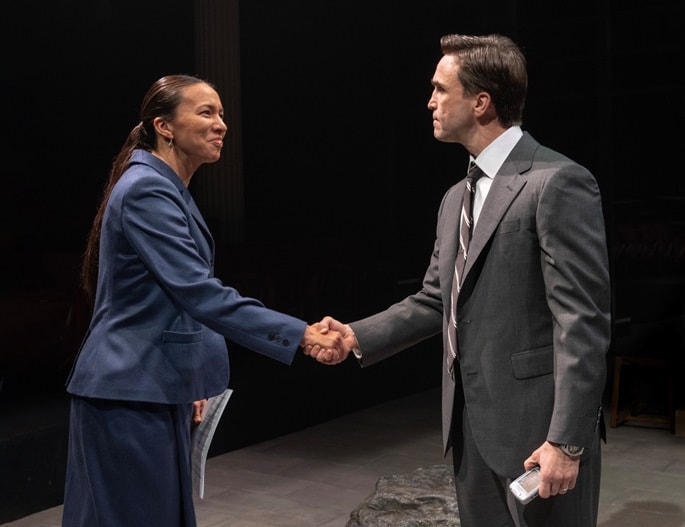
Elizabeth Frances stars as Jane and her predecessor Le-le-wa’-you, two enterprising Lenape women, one determined to climb the ladder of success on Wall Street and the other conscientiously preparing an increasing number of beaver furs for trade with the Europeans – both ill-advised and with disastrous results. Jane’s sister Debra, portrayed by Rainbow Dickerson, who also embodies her predecessor Toosh-ki-pa-kwis-i, is at odds with and critical of her workaholic sibling, resentful of her leaving the family and not being there for their father’s fatal open-heart surgery, and does not hesitate to express it. As their mother Bobbie (and the matrilineal Lenape’s elder Mother), Sheila Tousey is earthy, aware, and proud, not wanting her daughters to know about or to help with preventing the foreclosure, and calmly accepting of it.
The roles of the villainous, brutal, and moneygrubbing white men of both centuries are embodied by Joe Tapper as Jane’s boss Joe, beginning with a contentious and degrading interview with her for the Wall Street position, then convinced to hire her after hearing that she chose to be there rather than at her ailing father’s side at the hospital in Oklahoma, and the Dutch trader Jakob, who has moments of humanity but in the end chooses to obey the murderous orders of Minuit, played with aggressive venom by Jeffrey King, as is the Lehman Brothers’ head honcho Dick. King’s forceful monologue referencing the Tulipomania craze of 1634-37 – an economic phenomenon in the Golden Age of the Dutch Republic, when the prices of tulip bulbs on the speculative market soared to ten times the average annual income, then crashed – foretells the financial crisis of 2008, and bespeaks his characters’ unmitigated greed, while tying the two eras together.
David Kelly doubles as Jonas Michaelius, an equivocating 17th-century clergyman gone to Manahatta to convert the Lenape to Christianity and to establish a church there at the expense of the Company that’s massacring them, and Michael, a pastor and banker, and the longtime friend of Bobbie’s late churchgoing husband, who arranges a loan against her house to pay the hospital bills from his unsuccessful surgery, which she can’t afford. Apparently, the ostensibly devout characters missed the Biblical episode, recounted in all four Gospels, of Christ driving the moneychangers from the temple. But Nagle didn’t miss the opportunity to call them out, and their religion, for its lack of moral principles.
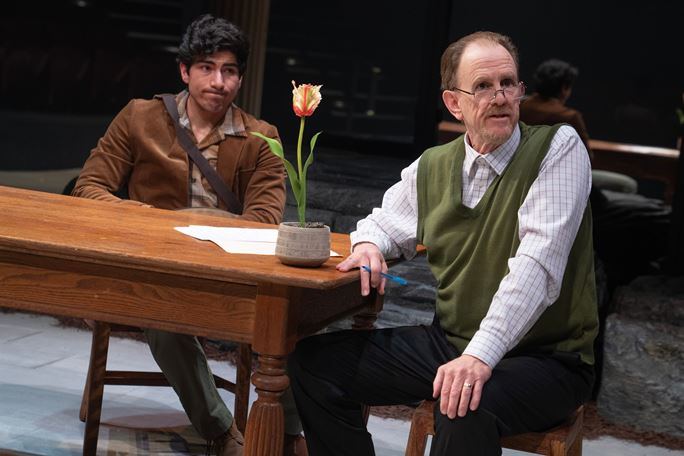
Rounding out the fine cast is Enrico Nassi as Michael’s adopted Lenape son Luke and his forebear Se-ket-tu-may-qua (Black Beaver), walking in both worlds and determined to preserve the Lenape traditions and language (there are passages spoken in Lenape throughout the play), while representing their people with integrity and sensitivity to their issues in the predominantly white world of finance and their now-lost Manahatta (as the conflicted Luke, who is put in an unfathomable position by his father, is wisely advised by Bobbie).
The actors’ engaging characterizations made me want to hear additional details of their backstories for a more complete understanding of their motivations and connections (including the history between Luke and Jane, the roots of her dysfunctional relationship with Debra, and what inspired her drive to succeed where those who came before her hadn’t, and Bobbie’s willingness to give up her home without a fight or assistance from a daughter who could well afford it), which are not always clear in the script.
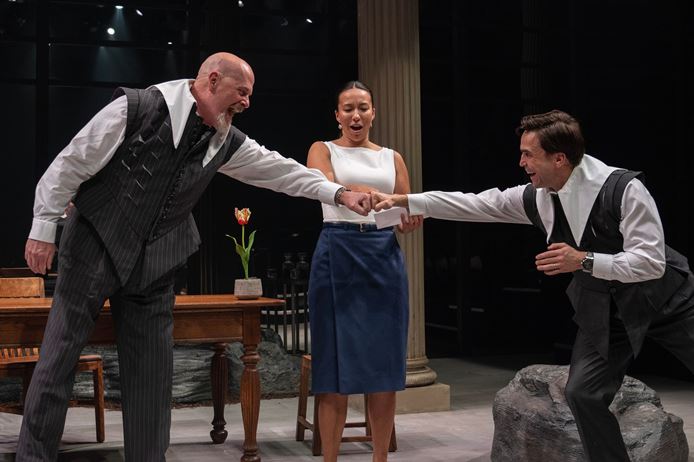
Costumes by Lux Haac fluidly define the ethnicities, economic circumstances, and colliding periods of the characters, with the white men ultimately seen in a mash-up of their historic garb with modern business trousers, while portraying the contemporary figures who perpetuate their time-honored ideals of the accumulation of wealth and property, no matter what the cost or who gets hurts. The minimal set by Marcelo Martínez García, accentuated by Jeanette Oi-Suk Yew’s lighting, sound and composition by Paul James Prendergast, and props by Rachel M.F. Kenner, consists of a central table with an omnipresent tulip and chairs, which serve as both the NYC office and the Oklahoma house, and a few resin rocks placed around the stage simultaneously suggest the landscape of early Manahatta. They’re all set before a mirrored back wall that reflects the present Manhattan audience, leaving us to reflect on our complicity in the capitalist system and appropriation of the Native land.
In conjunction with the play, an installation entitled KISHUX, by award-winning documentarian Devin Pickering, is available for viewing on the mezzanine level of the theater. Curated by the Lenape Center (whose Co-Founding Executive Director Joe Baker served as the cultural consultant for Manahatta), the exhibition features nine large-scale color photographs of the Lenape corn mask pole from dusk to dawn, which stands in the Lenape gardens from August to December, so you can further immerse yourself in the indigenous culture.
Running Time: Approximately one hour and 45 minutes, without intermission.
Manahatta plays through Saturday, December 23 2023, at The Public Theater, 425 Lafayette Street, NYC. For tickets (priced at $40-60, including fees), go online. Masks are strongly recommended at every performance.


